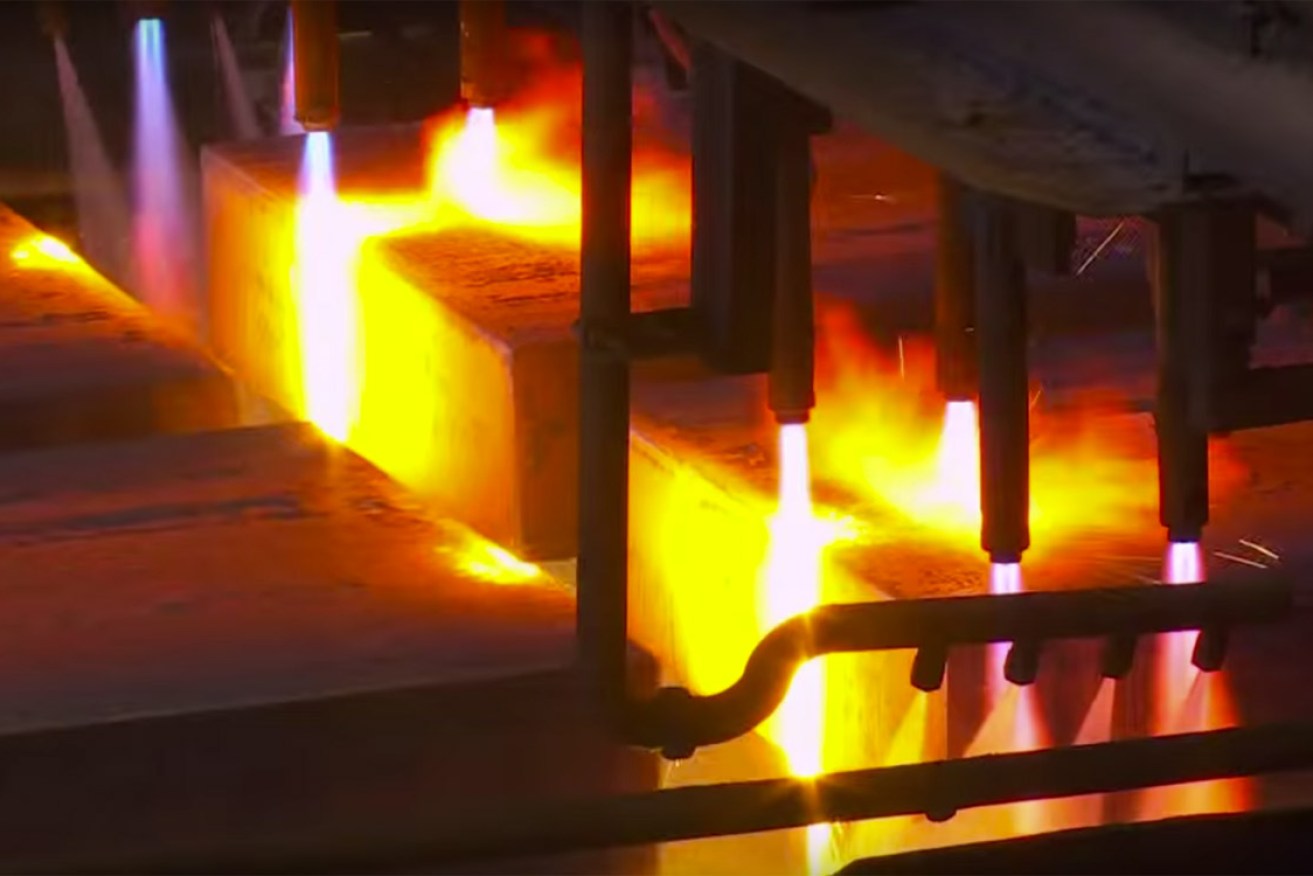Whyalla steelworks a crucible for future of Australian manufacturing
The latest threat to the Whyalla steelworks highlights Australia’s reliance on international decisions and supply lines, and the need for a strategic, sustainable industry policy, argues Barbara Pocock.

Steel being manufactured at Whyalla steelworks.
As I write, the Morrison Government is scrambling in the face of new revelations about the risks associated with the Astra Zeneca vaccine. Australia does not have the capacity to produce modern vaccines of the kind we need to deal with COVID.
We are dependent on other countries’ innovation and supply, all too often at the end of a long queue. And that creates huge risks.
This is just the latest example of the high price we pay for Australia’s 30-year failure to invest in technological innovation and manufacturing capability, or to develop and implement robust industry policy.
We did not need any more lessons: the COVID crisis has made clear the price of fragile supply chains and dependence of overseas production so that when a crisis hits, our country is left high and dry.
We must boost our national production and control of strategic industries in the face of such emergencies. Last week Australian scientists warned us that the risk of such crises is increasing with rapid climate change. This gives additional power to the green manufacturing imperative: will we get in front of the demand for low carbon products which is building – as Ross Garnaut and so many others, exhort us to do – or will we limp along at the rear with an anorexic industry ‘policy’ saddled to the last remnants of fossil fuel production?
The past three decades have seen the decline of manufacturing and research capability across our country, reflecting a failure of policy certainty, incentives to invest and cuts to our research activity – especially our universities.
South Australia is in the grip of another important example. Like a bad dream, the threat to jobs in the regional community of Whyalla has returned to haunt South Australia. The resilient citizens of Whyalla yet again have to wonder if the major employer in their town, the Whyalla Steelworks, is going to survive.
Not because of anything they have failed to do: the order books at the Whyalla steel plant are full, workers have taken pay cuts over recent years, and efficiencies have been aggressively pursued.
But none of that local activity protects against a refinancing challenge unfolding on the other side of the globe with the collapse in the UK of Greensill Capital, a major backer of Sanjeev Gupta’s GFG Alliance, owner of the steelworks.
It is vital that we retain steel production in Whyalla. And that we do so built on cheap renewables and zero-carbon manufacturing. Such plans exist for Whyalla: to make green steel – and go beyond that to develop our state’s renewable energy capacity and export potential for green hydrogen.
It is vital that the Whyalla steelworks not only survives, but thrives and provides an example of successful transition to renewable energy, low carbon manufacturing and regional growth.
South Australia has the highest rate of unemployment in the nation at present, and this doubles when we consider underemployment – or those looking for more hours of work. We need a thriving steel industry in Whyalla, to protect steel industry jobs and all their multiplier employment spinoffs, to fight the corrosive effects of long term, regional joblessness especially amongst the young, and to protect an essential strategic manufacturing capability.
Beyond defending the existing operation, we must invest in products that will be welcomed by trading partners that are looking at penalising carbon intensive products.
Australia has a long history of industry subsidies and handouts, and so often we pour money in without a quid pro quo or a long-term plan. The car industry was a case in point: we spent billions over decades to the benefit of big corporations with little to show for it in terms of public ownership or corporate loyalty.
In the end the Abbott Government’s sudden refusal of a relatively modest $200 million package of support broke the camel’s back, with big implications for our skill development, innovation capability and manufacturing strength into the long term.
Other countries are not so squeamish, spending billions to make plans and have a stake in industry survival and transition, and to protect essential strategic industries like car and steel production. In Australia the case for strong industry planning is especially strong given the small scale of our local markets and our geographic location.
Our governments at state and national level must work hard to back Whyalla and its transition to green steel manufacturing and renewables. Rather than hand over untied millions of taxpayer funds, governments should stand ready to purchase equity in the steelworks if GFG Alliance cannot refinance.
We all have a stake in the survival of steel in South Australia, and its pathway to green jobs of the future.
Without effective action, one of our vital regional communities remains at risk despite its hard work on so many fronts. We need coordinated action that leads to a better future and protects the public interest, and public funds.
And we need investment in our larger national research and innovation capacity to green our manufacturing and broader economy.
Leadership is everything right now.
Barbara Pocock is Emeritus Professor in the Business School at the University of South Australia and the lead Greens Senate candidate for South Australia.




